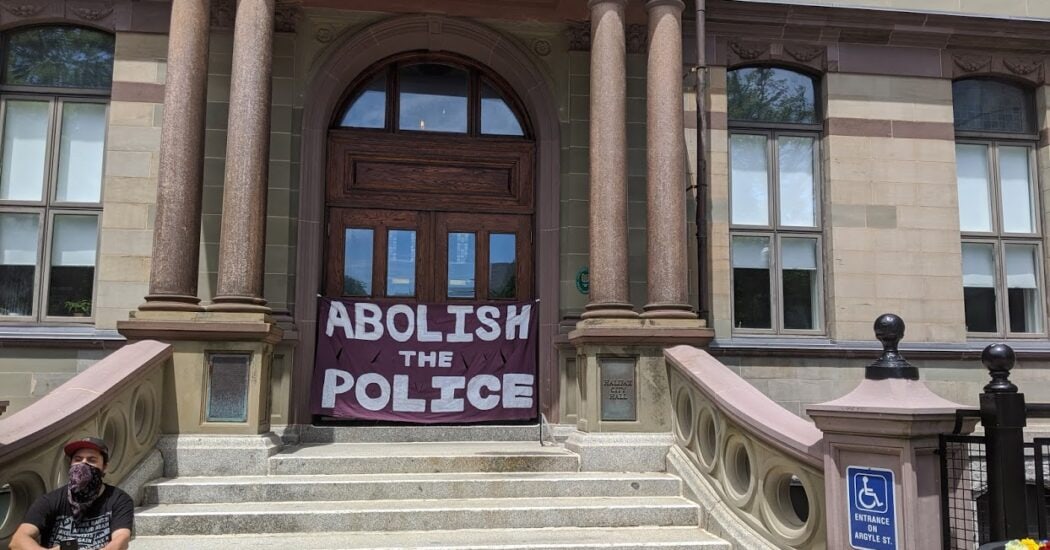
KJIPUKTUK (Halifax) – Halifax Councillor Waye Mason, in response to calls to defund the police, has submitted a motion to Council that would look for opportunities to move some tasks currently done by Halifax Regional Police to civilian services.
CBC’s Pam Berman reports that Mason believes the review “would support Black, Indigenious and other racialized communities who are looking for alternatives to the current policing models. There are things that are in police for historical reasons that maybe don’t make sense — bring back parks patrol and don’t ask police to do it,” Mason said.
Civilian mental health crisis intervention teams, bylaw enforcement and park patrols, and using civilians for some policing functions are among the examples of tasks that Mason believes might be shifted.
The recently formed Nova Scotia Policing Policy Working Group (NSPPWG) has pushed for defunding of the police and more stringent oversight. More immediately the group is asking for a broad consultation with the community aimed at reforming police practices, improving police accountability, and redistributing funds to civilian-led social services, including in the areas of housing, mental health, addictions, and employment support.
We talked with NSPPWG member Tari Ajadi about Mason’s motion, and how it aligns with the group’s vision.
To what extent is Councillor Mason’s motion helpful?
We’re happy to see that some members of Council are taking our calls seriously. This parallel process that’s emerging within Council to address some of the issues we’ve been raising is really important. We’re happy to see that being taken up.
But it’s early days. We will also be looking at how a HRM staff reacts, there are some members of staff in HRM that are presenting a blockade of progressive policy on Council. We’ll be scrutinizing that process quite heavily.
What I don’t see in Waye Mason’s motion is the community involvement that is so central in what your group is proposing.
These negotiations need to happen, but I think that there’s flexibility in this process. There are differences between what Councillor Mason is calling for in this motion and where we stand. I would hope that it’s more of a draft motion, I would hope that there could be amendments for example to allow for public hearings and more community involvement.
We’re not going to compromise on what we stand for. We’re going to be scrutinizing what’s done. Personally, my transformation is not in favour of creating new types of police force. That’s not where I stand, and that’s not where many of our other members stand. As well, abolition is paramount within our draft terms of reference. So, of course, creating a new type of police force is not exactly what we would align with.
What we want to see primarily at this stage is a truly community-led process to collectively reimagine what this could be. It’s important for us to not to simply stake out those terms, because we’re a limited number of actors within a much broader community. We will contribute our perspectives and our research, but we don’t want to speak on behalf of the entire community. That wouldn’t be right, it wouldn’t be democratic.
What about the notion of replacing police with sometimes very police-like institutions. Mason talks about park police, we’ve heard other people suggest the use of social workers to be mobilized for mental health crises.
Social workers might still produce the same kinds of results as police do. We certainly see that within the context of apprehensions of Black youths, Indigenous youths, etc. Those civilian services sometimes look an awful lot like the police. Speaking for myself, I don’t agree with that at all. That’s where it’s going to take a lot of time and educational work to bring other people along.
I’m aware of the need for us to completely transcend and deconstruct a lot of those colonial notions and mentalities that garner some people visible and other people invisible in the public space. At the same time, I’m also aware that this is something that I’ve been learning about and moving towards for a very long time, certainly for longer than I would think some of the council members. So I’m trying to negotiate here the gap between where I am and where my hopes are and where other people are.
What about the process that the Halifax Board of Police Commissioners appears to be initiating?
See also: The Halifax Board of Police Commissioners discusses defunding in secret
Our very first step needs to be a series of public hearings. If Councillor Mason’s motion can get us to a public hearing, fantastic, that’s what we want to see at this moment.
The Board has long standing issues with governance. It is abundantly clear, based on the past couple of meetings, that there seems to be little appetite to have a meaningful discussion. If that appetite arises, I would hope that the Board of Police Commissioners would be happy to intertwine their process with that Council process.
Whatever it ends up looking like, we cannot compromise on the need to see all this discussed by the community, I’m really talking baseline, that’s the bare minimum for moving forward.
Waye Mason was quoted as saying this process may take as long as two years.
No, it can’t and shouldn’t take two years. I would say that we have serious concerns with the way the HRM has approached various progressive policy proposals. We’ve seen, for example, with Counselor Lindell Smith’s motion to create a social policy lens, how the call for a living wage was distorted and transformed by staff members. There are clear impediments within HRM that will like to drag this out for as long as possible, that would like to defang any of our calls for change as much as possible, and that cannot happen.
See also: Building resilience and community agency during a pandemic
With a special thanks to our generous donors who make publication of the Nova Scotia Advocate possible.
Subscribe to the Nova Scotia Advocate weekly digest and never miss an article again. It’s free!



